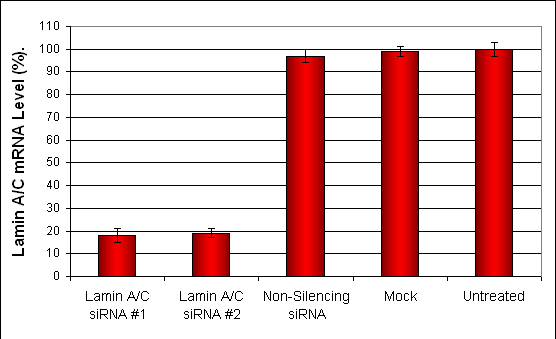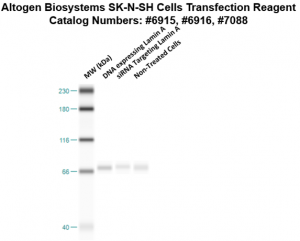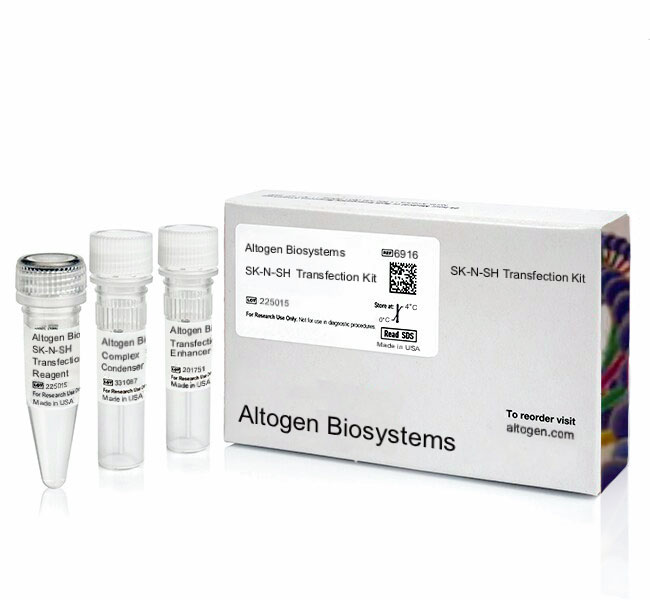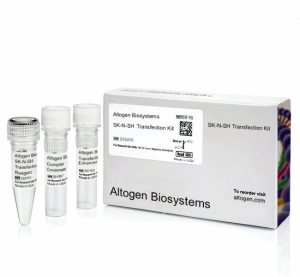Description
Purchase Orders: Click “Add to Cart” button to order, then email PO to orders@altogen.com.
Product Availability: In Stock.
Transfection Reagent for SK-N-SH Cells (Neuroblastoma Cells, HTB-11)
- Proprietary cationic lipids formulation
-
High transfection efficiency of small RNA (siRNA, shRNA, miRNA), mRNA, pDNA
-
A proven reagent for establishing stable cell lines
-
Optimized transfection protocols are adapted for use with both standard & reverse transfection methods
-
Download in vitro SK-N-SH transfection protocol: [PDF]
- Download SK-N-SH CRISPR/Cas9 transfection protocol: [PDF]
- Download PowerPoint presentation for SK-N-SH cells transfection kit: [PPT]
- UPC/GTIN/EAN: 860002089797
-
Brand: ALTOGEN®, developed and manufactured by Altogen Biosystems
Transfection Efficiency:
Reagent exhibits at least 81% transfection efficiency of siRNA delivery. Transfection efficiency was determined by qRT-PCR.
Product Description:
Transfection reagent is specially designed for the human neuroblastoma SK-N-SH cell line. High efficiency delivering both DNA and RNA into SK-N-SH cells.
Transfection Protocol and SDS:
Download Altogen Biosystems SK-N-SH Transfection Protocol: [PDF]
Download SDS: [PDF]
SK-N-SH Cell Line:
SK-N-SH is a human neuroblastoma cell line that is commonly used in research to study neuroblastoma, a type of cancer that affects nerve cells in the developing nervous system. The SK-N-SH cell line was originally derived from a metastatic site in a patient with neuroblastoma. Pediatric brain tumors are considered the leading cause of cancer-related deaths in children, despite new brain cancer treatments and therapies that are implemented every year. The vast majority of brain cancers are highly invasive and predict poor prognosis; therefore, innovative immunotherapy treatment options are desperately needed. Established cell lines are valuable preclinical models for brain cancer research that provide scientists with a better understanding of the biology of the disease and could lead to the development of brain cancer therapeutics. The SK-N-SH cell line was isolated by J.L. Biedler in 1970 from brain tissue of a 4-year-old female patient during a bone marrow biopsy of a metastatic neuroblastoma. SK-N-SH cells make for a good transfection host and show a higher doubling time as well as higher levels of dopamine-beta-hydroxylase production. The modal chromosome number of this cell line is 47. SH-SY5Y is a triple-cloned neuroblastoma, which originated in 1978 from the SK-N-SH line. A neuroblast-like subclone of SK-N-SH was named SH-SY. The SH-SY cell line was subcloned as SH-SY5 and was subcloned one more time as SH-SY5Y. This cell line is genetically female, with two X chromosomes. SH-SY5Y possess an abnormal chromosome called trisomy 1q. The cell line has been shown to be acetylcholinergic, glutamatergic and adenosinergic as well as dopamine beta-hydroxylase active. SH-SY5Y propagate through mitosis and differentiate by extending neurites to the surrounding area. The cells can form clusters of cells that remind of their malignant nature. However, different treatments, including retinoic acid and brain-derived neurotrophic factor, can make the cells to dendrify and differentiate. It has been shown that citrus limonoid glucosides can be toxic to SH-SY5Y cancer cells. The SK-N-SH neuroblastoma cell line exhibits neurite outgrowths through modulated differentiation, which makes these cells very useful in the study of neural pathways. Altogen Biosystems provides lipid-based transfection kits for the SK-N-SH cell line.
Mutations:
| ALK | 238 | 37 | 2 | 29443695 | 29443695 | Missense_Mutation | SNP | G | T |
| SMARCA4 | 6597 | 37 | 19 | 11134251 | 11134251 | Missense_Mutation | SNP | C | T |
| OR1L4 | 254973 | 37 | 9 | 125486897 | 125486897 | Missense_Mutation | SNP | C | A |
| AGRN | 375790 | 37 | 1 | 989314 | 989314 | Missense_Mutation | SNP | G | A |
| PER3 | 8863 | 37 | 1 | 7887389 | 7887389 | Silent | SNP | C | T |
| PADI2 | 11240 | 37 | 1 | 17422422 | 17422422 | Missense_Mutation | SNP | C | A |
| TMEM57 | 55219 | 37 | 1 | 25780773 | 25780773 | Missense_Mutation | SNP | G | A |
| KIAA0319L | 79932 | 37 | 1 | 35940458 | 35940458 | Silent | SNP | C | A |
| MPL | 4352 | 37 | 1 | 43805147 | 43805147 | Missense_Mutation | SNP | G | C |
| LCE4A | 199834 | 37 | 1 | 152681740 | 152681740 | Missense_Mutation | SNP | C | G |
| OR6Y1 | 391112 | 37 | 1 | 158517288 | 158517288 | Missense_Mutation | SNP | A | G |
Data:

Figure 1. siRNAs targeting Lamin A/C mRNA or non-silencing control siRNA were transfected into SKNSH cells following the recommended protocol. At 48 hours post-transfection the cells were analyzed by RT-PCR for Lamin A/C gene expression levels. 18S rRNA levels were used to normalize the Lamin A/C data. Values are normalized to untreated sample. Data are means ± SD (n=4).

Figure 2. Protein expression of Lamin A in SK-N-SH cells. DNA plasmid expressing Lamin A or siRNA targeting Lamin A were transfected into SK-N-SH cells following Altogen Biosystems transfection protocol. At 72 hours post-transfection the cells were analyzed by Western Blot for protein expression levels (normalized by total protein, 10 µg of total protein loaded per each well). Untreated cells used as a negative control.
Selected in vivo transfection product citations (ALTOGEN® IN VIVO Transfection Kits used in the following publications):
- 2008 454(7203):523-7. Innate immunity induced by composition-dependent RIG-I …Saito et al [PDF]
- Am J Pathology. 2010 177(4):1870-80. Role of ocular complement factor H in a murine model … Lyzogubov et al [PDF]
- Nature Biotechnology. 2011 29(4):341-5. Delivery of siRNA to the mouse brain by … Alvarez-Erviti et al [PDF]
- Circulation Research. 2010 15;107(8). Kruppel-like factor-4 transcriptionally regulates … Cowan et al [PDF]
- 2012 59(1):158-66. Role of uncoupled endothelial nitric oxide synthase … Gao et al [PDF]
- Jounal of Biological Chemistry. 2012 287(4):2907. Chaperoning of mutant p53 protein … Gogna et al [PDF]
- PLoS Pathogens. 2012 8(8) Uridine composition of the poly-U/UC tract of HCV RNA … Schnell et al [PDF]
- J Proteome Res. 2012(11) Retinal proteome analysis in a mouse model of oxygen-induced … Kim et al [PDF]
- 2011 141(2) Differential type I interferon-mediated autophagic trafficking … Desai et al [PDF]
- PLoS Pathog. 2014 10(10) Exosomes from hepatitis C infected patients transmit HCV … Bukong et al [PDF]
Altogen Biosystems is a life sciences company that offers cell type-specific and pre-optimized transfection products, elecroporation kits, and in vivo delivery reagents. Advanced formulation of reagents and optimized transfection protocols provide efficient intracellular delivery of protein, DNA, mRNA, shRNA and siRNA molecules. Read more about transfection technology at Altogen’s Transfection Resource. Altogen Labs provides safety and efficacy preclinical research services. GLP-compliant studies for IND applications, and drug development, including over 90 in-house validated xenograft models, safety toxicology, etc (visit AltogenLabs.com).
Volume Options:
- 0.5 ml (Catalog #6915)
- 1.5 ml (Catalog #6916)
- 1.5 ml CRISPR (Catalog #2196)
- 8.0 ml (Catalog #7088)
Purchase Orders: Click “Add to Cart” button to order, then email PO to orders@altogen.com.
Product Availability: In Stock.






